Probiotics for treatment of chronic constipation in children
- PMID: 35349168
- PMCID: PMC8962960
- DOI: 10.1002/14651858.CD014257.pub2
Probiotics for treatment of chronic constipation in children
Abstract
Background: Functional constipation is defined as chronic constipation with no identifiable underlying cause. It is a significant cause of morbidity in children, accounting for up to 25% of visits to paediatric gastroenterologists. Probiotic preparations may sufficiently alter the gut microbiome and promote normal gut physiology in a way that helps relieve functional constipation. Several studies have sought to address this hypothesis, as well as the role of probiotics in other functional gut disorders. Therefore, it is important to have a focused review to assess the evidence to date.
Objectives: To evaluate the efficacy and safety of probiotics for the management of chronic constipation without a physical explanation in children.
Search methods: On 28 June 2021, we searched CENTRAL, MEDLINE, Embase, CINAHL, AMED, WHO ICTR, and ClinicalTrials.gov, with no language, date, publication status, or document type limitations.
Selection criteria: We included randomised controlled trials (RCTs) that assessed probiotic preparations (including synbiotics) compared to placebo, no treatment or any other interventional preparation in people aged between 0 and 18 years old with a diagnosis of functional constipation according to consensus criteria (such as Rome IV).
Data collection and analysis: We used standard methodological procedures expected by Cochrane.
Main results: We included 14 studies (1127 randomised participants): 12 studies assessed probiotics in the treatment of functional constipation, whilst two studies investigated synbiotic preparations. Three studies compared probiotics to placebo in relation to the frequency of defecation at study end, but we did not pool them as there was very significant unexplained heterogeneity. Four studies compared probiotics to placebo in relation to treatment success. There may be no difference in global improvement/treatment success (RR 1.29, 95% CI 0.73 to 2.26; 313 participants; low-certainty evidence). Five studies compared probiotics to placebo in relation to withdrawals due to adverse events, with the pooled effect suggesting there may be no difference (RR 0.64, 95% CI 0.21 to 1.95; 357 participants; low-certainty evidence). The pooled estimate from three studies that compared probiotics plus an osmotic laxative to osmotic laxative alone found there may be no difference in frequency of defecation (MD -0.01, 95% CI -0.57 to 0.56; 268 participants; low-certainty evidence). Two studies compared probiotics plus an osmotic laxative to osmotic laxative alone in relation to global improvement/treatment success, and found there may be no difference between the treatments (RR 0.95, 95% CI 0.79 to 1.15; 139 participants; low-certainty evidence). Three studies compared probiotics plus osmotic laxative to osmotic laxative alone in relation to withdrawals due to adverse events, but it is unclear if there is a difference between them (RR 2.86, 95% CI 0.12 to 68.35; 268 participants; very low-certainty evidence). Two studies compared probiotics versus magnesium oxide. It is unclear if there is a difference in frequency of defecation (MD 0.28, 95% CI -0.58 to 1.14; 36 participants), treatment success (RR 1.08, 95% CI 0.74 to 1.57; 36 participants) or withdrawals due to adverse events (RR 0.50, 95% CI 0.05 to 5.04; 77 participants). The certainty of the evidence is very low for these outcomes. One study assessed the role of a synbiotic preparation in comparison to placebo. There may be higher treatment success in favour of synbiotics compared to placebo (RR 2.32, 95% CI 1.54 to 3.47; 155 participants; low-certainty evidence). The study reported that there were no withdrawals due to adverse effects in either group. One study assessed a synbiotic plus paraffin compared to paraffin alone. It is uncertain if there is a difference in frequency of defecation (MD 0.74, 95% CI -0.96, 2.44; 66 participants; very low-certainty evidence), or treatment success (RR 0.91, 95% CI 0.71 to 1.17; 66 participants; very low-certainty evidence). The study reported that there were no withdrawals due to adverse effects in either group. One study compared a synbiotic preparation to paraffin. It is uncertain if there is a difference in frequency of defecation (MD -1.53, 95% CI -3.00, -0.06; 60 participants; very low-certainty evidence) or in treatment success (RR 0.86, 95% CI 0.65, 1.13; 60 participants; very low-certainty evidence). The study reported that there were no withdrawals due to adverse effects in either group. All secondary outcomes were either not reported or reported in a way that did not allow for analysis.
Authors' conclusions: There is insufficient evidence to conclude whether probiotics are efficacious in successfully treating chronic constipation without a physical explanation in children or changing the frequency of defecation, or whether there is a difference in withdrawals due to adverse events when compared with placebo. There is limited evidence from one study to suggest a synbiotic preparation may be more likely than placebo to lead to treatment success, with no difference in withdrawals due to adverse events. There is insufficient evidence to draw efficacy or safety conclusions about the use of probiotics in combination with or in comparison to any of the other interventions reported. The majority of the studies that presented data on serious adverse events reported that no events occurred. Two studies did not report this outcome. Future studies are needed to confirm efficacy, but the research community requires guidance on the best context for probiotics in such studies, considering where they should be best considered in a potential treatment hierarchy and should align with core outcome sets to support future interpretation of findings.
Copyright © 2022 The Cochrane Collaboration. Published by John Wiley & Sons, Ltd.
Conflict of interest statement
KCW has none to declare.
VS has none to declare.
MG ‐ Since January 2019, I have received travel fees to attend international scientific and training meetings from two Pharma companies. These grants included no honoraria, inducement, advisory role or any other relationship and were restricted to the travel and meeting related costs of attending such meetings. This was Digestive Diseases Week May 2019 from companies including Biogaia (2019) and Tillots (2019). Neither of these companies have had any involvement in any works completed by me and I have never had any payments for any other activities for them, as confirmed below. From this date onwards, I have made a personal undertaking to take no further funds from any pharmaceutical or formula company in any form for travel or other related activities. This is to lift the limitations such funding has on my ability to act as a first and corresponding author on reviews, in line with the Cochrane policies on such matters, and is reported in line with these policies. These current declarations will expire in May 2022 and this statement will be updated regularly to reflect this.
AKA has none to declare.
ALC has none to declare.
GH has none to declare.
LFR has none to declare.
AF acted as a consultant for QOL Medical 2018 to 2019.
LFV has none to declare.
AL has none to declare.
MS has received honoraria from the following companies in the last three years: IHS (Innovative Health Solutions): Advisory Panel; QOL Medical: Pediatric Advisory Panel; IQVIA: Consultant; Sucampo: Consultant. None of these companies produce any of the interventions or comparators studied in this review.
Figures
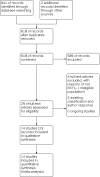
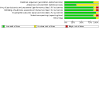
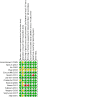
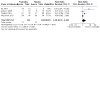

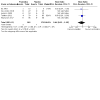
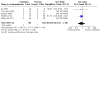
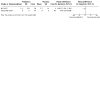

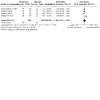
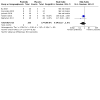



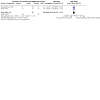
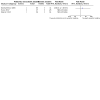
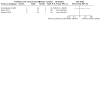
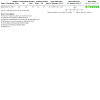
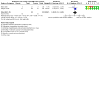
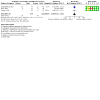
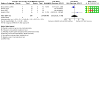

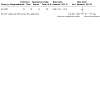
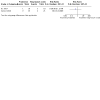

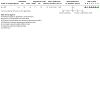


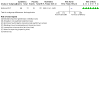

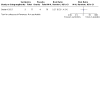

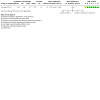
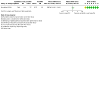


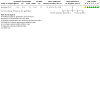
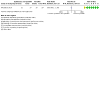


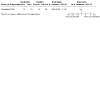
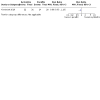

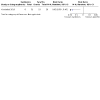
Comment in
-
Probiotics for treatment of chronic constipation in children: Summary of a Cochrane review.Explore (NY). 2023 May-Jun;19(3):487-488. doi: 10.1016/j.explore.2023.03.003. Epub 2023 Mar 21. Explore (NY). 2023. PMID: 36964022 No abstract available.
References
References to studies included in this review
Banaszkiewicz 2005 {published data only}
-
- Banaszkiewicz A, Bibik A, Szajewska H.Functional constipation in children: a follow-up study [Prospektywna obserwacja dzieci z zaparciem czynnościowym]. Pediatria Współczesna Gastroenterologia, Hepatologia i Żywienie Dziecka 2006;8(1):21-3.
-
- Banaszkiewicz A, Szajewska H.Ineffectiveness of Lactobacillus GG as an adjunct to lactulose for the treatment of constipation in children: a double-blind, placebo-controlled randomized trial. Journal of Pediatrics 2005;146(3):364-9. [PMID: ] - PubMed
Basturk 2017 {published data only}
-
- Baştürk A, Artan R, Atalay A, Yılmaz A.Investigation of the efficacy of synbiotics in the treatment of functional constipation in children: a randomized double-blind placebo-controlled study. Turkish Journal of Gastroenterology 2017;28(5):388-93. [PMID: ] - PubMed
Bu 2007 {published data only}
-
- Bu LN, Chang MH, Ni YH, Chen HL, Cheng CC.Lactobacillus casei rhamnosus Lcr35 in children with chronic constipation. Pediatrics International 2007;49(4):485-90. [PMID: ] - PubMed
Chao 2016 {published data only}
-
- Chao HC, Hsu YC, Chen SY, Chen CC.Impact of probiotics on constipation and intestinal microflora in children with functional constipation. Journal of Pediatric Gastroenterology and Nutrition 2016;63(Supplement 2):S37.
Coccorullo 2010 {published data only}
-
- Coccorullo P, Strisciuglio C, Martinelli M, Miele E, Greco L, Staiano A.Lactobacillus reuteri (DSM 17938) in infants with functional chronic constipation: a double-blind, randomized, placebo-controlled study. Journal of Pediatrics 2010;157(4):598-602. [PMID: ] - PubMed
Guerra 2011 {published data only}
Jadresin 2018 {published data only}
-
- Jadrešin O, Sila S, Trivić I, Mišak Z, Hojsak I, Kolaček S.Lack of Benefit of Lactobacillus reuteri DSM 17938 as an Addition to the Treatment of Functional Constipation. Journal of Pediatric Gastroenterology and Nutrition 2018;67(6):763–6. [PMID: ] - PubMed
Khodadad 2010 {published data only}
Kubota 2020 {published data only}
Russo 2017 {published data only}
-
- Russo M, Giugliano FP, Quitadamo P, Miele E, Staiano A.Efficacy of a mixture of probiotic agents, including bifidobacterium breve, infantis and longum, as complementary therapy for chronic functional constipation in childhood. Digestive and Liver Disease 2015;47(Supplement 4):E240. [DOI: 10.1016/j.dld.2015.07.057] - DOI
Tabbers 2011 {published data only}
-
- Horvath A, Chmielewska A, Szajewska H.Functional constipation in children: a follow-up of two randomized controlled trials [Zaparcie czynnościowe u dzieci – prospektywna ocena z dwóch badań klinicznych z randomizacją]. Pediatria Polska 2013;88(3):219-23. [DOI: 10.1016/j.pepo.2013.02.005] - DOI
-
- Tabbers M, Chmielewska AM, Roseboom M, Reitsma J, Szajewska H, Benninga MA.Fermented dairy product containing bifidobacterium lactis Dn-173 010 in treatment of childhood constipation: a randomized, double-blind, placebo-controlled trial. Gastroenterology 2010;138:S129.
-
- Tabbers MM, Chmielewska A, Roseboom MG, Boudet C, Perrin C, Szajewska H, et al.Effect of the consumption of a fermented dairy product containing Bifidobacterium lactis DN-173 010 on constipation in childhood: a multicentre randomised controlled trial. BMC Pediatrics 2009;9:22. [DOI: 10.1186/1471-2431-9-22] - DOI - PMC - PubMed
-
- Tabbers MM, Chmielewska A, Roseboom MG, Crastes N, Perrin C, Reitsma JB, et al.Fermented milk containing Bifidobacterium lactis DN-173 010 in childhood constipation: a randomized, double-blind, controlled trial. Pediatrics 2011;127(6):e1392-9. [PMID: ] - PubMed
Wegner 2018 {published data only}
-
- Dembinski L, Bulsa GC, Socha P, Wegner A, Banaszkiewicz A, Kierkuś J, et al.Effectiveness of lactobacillus reuteri In the treatment of functional constipation In children: a randomized, double–blind, placebo-controlled, multicenter trial. United European Gastroenterology Journal 2015;2(Supplement 1).
-
- Wegner A, Banaszkiewicz A, Kierkus J, Landowski P, Korlatowicz-Bilar A, Wiecek S, et al.The effectiveness of Lactobacillus reuteri DSM 17938 as an adjunct to macrogol in the treatment of functional constipation in children. A randomized, double-blind, placebo-controlled, multicentre trial. Clinics and Research in Hepatology and Gastroenterology October 2018;42(5):494-500. [PMID: ] - PubMed
Wojtyniak 2017 {published data only}
-
- Wojtyniak K, Horváth A, Dziechciarz P, Szajewska H.Lactobacillus casei rhamnosus Lcr35 in the management of functional constipation in children: a randomized trial. Journal of Pediatrics 2017;184:101-5. [PMID: ] - PubMed
-
- Wojtyniak K, Horvath A, Dziechciarz P, Szajewska H.Lactobacillus casei rhamnosus Lcr35 in the management of functional constipation in children: a randomized trial. Journal of Pediatric Gastroenterology and Nutrition 2017;64:414. - PubMed
Zaja 2021 {published data only}
-
- Žaja O, Fiolić M, Ćuk MC, Tiljak MK.The role of L. reuteri DSM17938 in nutritional recovery and treatment of constipation in children and adolescents with anorexia nervosa-a randomized, double blind, placebo controlled study. Clinical Nutrition ESPEN 2021;46:47-53. - PubMed
-
- Žaja O, Fiolic M, Bradovski Z, Astrom M.The role of lactobacillus reuteri DSM 17938 in nutritional recovery and treatment of constipation in children and adolescents with anorexia nervosa - a randomised, double blind, placebo controlled study. Journal of Pediatric Gastroenterology and Nutrition April 2018;66(Supplement 2):1041.
References to studies excluded from this review
Bekkali 2007 {published data only}
Magro 2014 {published data only}
-
- Magro DO, Oliveira LM, Bernasconi I, Ruela MdeS, Credidio L, Barcelos IK, et al.Effect of yogurt containing polydextrose, Lactobacillus acidophilus NCFM and Bifidobacterium lactis HN019: a randomized, double-blind, controlled study in chronic constipation. Nutrition Journal 2014;13:1-5. [PMID: ] - PMC - PubMed
Olgac 2013 {published data only}
-
- Olgaç MA, Sezer OB, Özçay F.Comparison of the efficacy of probiotics and lactulose treatments in children with functional constipation and determination of the effects of constipation treatment on quality of life [Fonksiyonel kabızlığı olan çocuklarda probiyotik ve laktuloz tedavilerinin etkinliğinin karşılaştırılması ve kabızlık tedavisinin yaşam kalitesi üzerine olan etkisinin değerlendirilmesi]. Çocuk Sağlığı ve Hastalıkları Dergisi 2013;56(1):1-7.
Szajewska 2011 {published data only}
-
- Szajewska H.Probiotics and functional gastrointestinal disorders. Journal of Pediatric Gastroenterology and Nutrition 2011;53:S30-2. - PubMed
References to studies awaiting assessment
Abediny 2016 {published data only}
-
- Abediny M, Ataiee P, Afkhamzadeh A, Seifmanesh M, Sedaghat B.The effect of probiotics on the treatment of functional constipation in children of 4–12 years of age. Journal of Isfahan Medical School 2016;33(368):2448-54.
Additional references
Attaluri 2010
Banaszkewicz 2005
-
- Banaszkewicz A, Szajewska H.Ineffectiveness of lactobacillus GG as an adjunct to lactulose for the treatment of constipation in children: a double-blind, placebo-controlled randomized trial. Journal of Pediatrics 2005;146:364-9. - PubMed
Egger 1997
Glanville 2019a
-
- Glanville J, Foxlee R, Wisniewski S, Noel-Storr A, Edwards M, Dooley G.Translating the Cochrane EMBASE RCT filter from the Ovid interface to Embase.com: a case study. Health Information and Libraries Journal 2019;36(3):264-77. [PMID: ] - PubMed
Glanville 2019b
-
- Glanville J, Dooley G, Wisniewski S, Foxlee R, Noel-Storr A.Development of a search filter to identify reports of controlled clinical trials within CINAHL Plus. Health Information and Libraries Journal 2019;36(1):73-90. [PMID: ] - PubMed
Gordon 2016
GRADEpro GDT [Computer program]
-
- GRADEpro GDT.Version accessed 16 March 2022. Hamilton (ON): McMaster University (developed by Evidence Prime). Available at gradepro.org.
Higgins 2011
-
- Higgins JP, Green S, editor(s).Cochrane Handbook for Systematic Reviews of Interventions Version 5.1.0 (updated March 2011). The Cochrane Collaboration, 2011. Available from training.cochrane.org/handbook/archive/v5.1/.
Higgins 2020
-
- Higgins JP, Thomas J, Chandler J, Cumpston M, Li T, Page MJ, Welch VA, editor(s).Cochrane Handbook for Systematic Reviews of Interventions version 6.1 (updated September 2020). Cochrane, 2020. Available from training.cochrane.org/handbook.
Horvath 2013
-
- Horvath A, Szajewska H.Probiotics, prebiotics, and dietary fiber in the management of functional gastrointestinal disorders. Evidence-based Research in Pediatric Nutrition 2013;108:40-8. - PubMed
Hyams 2016
-
- Hyams JS, Lorenzo CD, Saps M, Shulman RJ, Staiano A, Tilburg MV.Childhood functional gastrointestinal disorders: child/adolescent. Gastroenterology 2016;150:1456-68.
Hyman 2006
-
- Hyman PE, Milla PJ, Marc A.Childhood functional gastrointestinal disorders: neonate/toddler. Gastroenterology 2006;130(5):1519-26. - PubMed
Koppen 2018
-
- Koppen I, Vriesman M, Saps M, Rajindrajith S, Shi X, Van Etten-Jamaludin F, et al.Prevalence of functional defecation disorders in children: a systematic review and meta-analysis. Journal of Pediatrics 2018;198:121-30. - PubMed
Kuizenga‐Wessel 2017
Lefebvre 2019
-
- Lefebvre C, Glanville J, Briscoe S, Littlewood A, Marshall C, Metzendorf MI, et al.Chapter 4: Searching for and selecting studies. In: Higgins JP, Thomas J, Chandler J, Cumpston M, Li T, Page MJ, Welch VA, editors(s). Cochrane Handbook for Systematic Reviews Interventions. 2nd edition. Chichester (UK): John Wiley & Sons, 2019:67-108.
Page 2021
Pitkin 1999
-
- Pitkin RM, Branagan MA, Burmeister LF.Accuracy of data in abstracts of published research articles. JAMA 1999;281:1110-1. - PubMed
Rasquin 2006
Review Manager 2020 [Computer program]
-
- Review Manager 5 (RevMan 5).Version 5.4. The Cochrane Collaboration, 2020.
RevMan Web 2022 [Computer program]
-
- Review Manager Web (RevMan Web).Version 4.0.2. The Cochrane Collaboration, 2022. Available at revman.cochrane.org.
Sadeghzadeh 2014
Savino 2013
-
- Savino F, Ceratto S, Opramolla A, Locatelli E, Tarasco V, Amaretti A, et al.Coliforms and infant colic: fish analysis of fecal samples of breastfed and formula fed infants. Journal of Paediatric Gastroenterology and Nutrition 2013;56:472.
Tabbers 2010
Tabbers 2014
-
- Tabbers MM, DiLorenzo C, Berger MY, Faure C, Langendam MW, Nurko S, et al.Evaluation and treatment of functional constipation in infants and children: evidence-based recommendations from ESPGHAN and NASPGHAN. Journal of Pediatric Gastroenterology and Nutrition 2014;58(2):258-74. - PubMed
Tabbers 2015
Waller 2011
Wegh 2021
-
- Wegh C, Baaleman D, Tabbers M, Smidt H, Benninga M.Nonpharmacologic treatment for children with functional constipation: a systematic review and meta-analysis. The Journal of Pediatrics 2021;240:136-49. - PubMed
References to other published versions of this review
Publication types
MeSH terms
LinkOut - more resources
Full Text Sources
Medical

